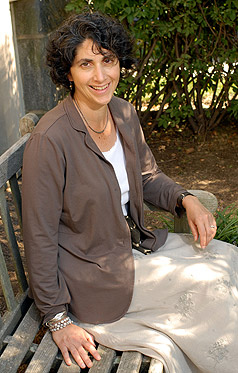Berkeleyan
Conservation biologist Claire Kremen wins MacArthur 'genius' award
Building portals, studying pollinators pays off with a surprise phone call
![]()
| 26 September 2007
Claire Kremen, a conservation biologist whose applied research advances the fields of ecology, biodiversity, and agriculture, has been named a MacArthur Fellow, one of 24 nationwide "genius" award recipients announced Tuesday, Sept. 25, by the John D. and Catherine T. MacArthur Foundation.
 Claire Kremen (MacArthur Foundation photo) |
Kremen, an assistant professor of environmental science, policy, and management in the College of Natural Resources, will receive an unrestricted $500,000 award over the next five years.
This year's award makes Kremen, 46, the 41st UC Berkeley MacArthur Fellowship recipient since the awards were first given out in 1981. This year's awardees also include three Berkeley alumni.
The foundation recognized Kremen's pioneering conservation-planning initiative in Masoala National Park, Madagascar's largest nature reserve. Her ability to move scientific theory to practical applications helped establish the protected region on sound conservation principles that also took the needs of the local population into account.
"We've learned in conservation management that it is so important to get buy-in from the locals, who are most likely to take immediate action to support the park or not," says Kremen. "That's why we included a sustainable- forestry plan to provide local people with a source of income while saving enough of the forest to ensure the survival of protected species."
Kremen continues her work in Madagascar by studying the impacts of deforestation on species distributions and the creation of a Web-based biodiversity database. The Web portal promises to provide researchers with tools needed for conservation planning and monitoring.
The foundation also highlighted Kremen's recent studies of the behavior of bees and other natural pollinators, and their critical role in the global human food supply. The studies showed that the ability of native bees to pollinate farm crops adequately is dependent on their access to natural habitats, underscoring the importance of restoring and protecting natural environments on farms. Her studies have also found that one-third of the world's crop production relies upon pollinators.
Among this year's 24 MacArthur Fellowship recipients are a biomedical scientist, a blues musician, a forensic anthropologist, and a spider-silk biologist, all of whom learned of the award this past week through a surprise phone call from the foundation.
A gauntlet is thrown
MacArthur Fellowships offer "no strings attached" funds that allow awardees to accelerate their current activities or take their work in new directions.
"I'm both honored and humbled to have gotten this award," says Kremen. "Winning the award is like having a gauntlet thrown down before you, saying that you did well, but now what are you going to do next? It's really exciting, and it's a challenge to figure out how to best use this opportunity."
The three Berkeley alumni honored this year are Jay Rubenstein, an associate professor of history at the University of Tennessee; Yoky Matsuoka, an associate professor of computer science and engineering at the University of Washington; and Michael Elowitz, an assistant professor of biology and applied physics at the California Institute of Technology.
Rubenstein, who received his history Ph.D. in 1997, is an expert on medieval history being honored for his analysis of the First Crusade and its impact on the future of Europe. Matsuoka is being recognized for her research on the central nervous system and its application to robotic technology in the emerging field of neurorobotics. She earned her bachelor's degree in electrical engineering and computer sciences at Berkeley in 1993. And Elowitz is being honored for his research on genetic interactions by using computational modeling to design and test artificial genetic circuits. Elowitz received his Berkeley bachelor's degree in physics in 1992.
"These new MacArthur Fellows, extraordinary men and women of all ages and in many fields, honor and inspire us with their talent, their courage, and their deep commitment," said MacArthur President Jonathan Fanton in a foundation news release. "With the gift of time and unfettered opportunity to create and explore, we are confident that the Fellows will follow their hearts and their minds wherever they lead, making new discoveries and making a difference in the world."

